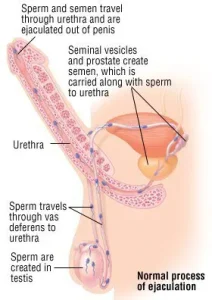Overview
Diagnosis
A physical exam and review of your medical history may be enough to diagnose delayed ejaculation. However, if another underlying problem is suspected, further testing or referral to a specialist may be necessary.
Tests may include:
-
Blood tests – Used to check hormone levels, diabetes, heart disease, and other health conditions.
-
Urinalysis – A urine test to detect signs of diabetes, infections, or other underlying issues.
Treatment
Treatment for delayed ejaculation depends on the underlying cause. It may involve adjusting current medications, starting new treatments, or receiving psychological counseling.
Medications
If a prescribed drug is contributing to delayed ejaculation, lowering the dose or switching to a different medication may help. In some cases, adding another medicine can be beneficial.
There are no specific drugs approved solely for treating delayed ejaculation. However, the following medications may be prescribed to address underlying causes:
-
Amantadine – used for Parkinson’s disease
-
Buspirone – used for anxiety
-
Cyproheptadine – used for allergies
Psychological counseling
Therapy can be effective when emotional or psychological factors such as anxiety, depression, or relationship issues contribute to delayed ejaculation. You may meet with a psychologist or counselor individually or with your partner. Seeing a sex therapist — a specialist trained in sexual health — can also be beneficial.
Coping and Support
Chronic delayed ejaculation can cause emotional strain and stress for both partners. If it occurs occasionally, try not to assume it’s a permanent condition or expect it to happen every time.
Open communication with your partner is essential. Reassure them that difficulty ejaculating is not a sign of lost interest or attraction. Discussing the issue honestly and seeking counseling together can improve understanding and treatment outcomes.
Preparing for Your Appointment
If you’re experiencing persistent difficulty reaching orgasm, consult your healthcare provider. You may be referred to:
-
A urologist (male reproductive health specialist)
-
An endocrinologist (hormone specialist)
-
A mental health professional (psychologist, psychiatrist, or social worker)
What you can do before your visit:
-
Bring your partner if possible, as they can provide helpful insights.
-
Make a list of symptoms and when they began.
-
Note any major life changes, stress, or recent illnesses.
-
Prepare a list of all medications, supplements, or herbal products you use, including dosages.
-
Write down questions you want to ask your doctor.
Questions to ask your doctor:
-
What is the most likely cause of my delayed ejaculation?
-
What tests do I need?
-
Is this condition temporary or ongoing?
-
What treatment options do you recommend?
-
How can I manage delayed ejaculation along with other health conditions?
-
Where can I learn more about this condition?
What your doctor may ask:
-
Is delayed ejaculation occasional or constant?
-
Can you ejaculate during intercourse, or only through masturbation?
-
How long does it typically take to ejaculate?
-
Have you noticed changes in sexual desire or other sexual issues?
-
Are there any relationship difficulties?
-
Do you experience erectile dysfunction?
-
Do you use alcohol or drugs, and if so, how much?
Advertisement

